
Why more Brits are turning to food banks
In an upmarket neighborhood in west London, a growing number of people are visiting a storefront tucked between a bicycle shop and a coffee house that charges no money and caters exclusively to the less fortunate.
Dad’s House is one of 2,200 food banks in the United Kingdom that serve Britons who are struggling to afford basic necessities. Billy McGranaghan, its founder, told CNN Business that "the future is bleak" for the people who frequent his shop.
London’s food banks were busy before the pandemic. But now, as the United Kingdom braces for a second winter with coronavirus, rising food prices, higher energy costs and cuts to government benefits are putting huge pressure on household budgets and forcing legions of people to turn to charity.
Food banks in the capital city have reported a surge of visits in recent weeks, with more and more working professionals seeking help with groceries following the end of a government program that subsidized millions of jobs during the pandemic and a reduction in welfare payments to those with lower incomes.
McGranaghan, 58, estimates that he's added 70 recipients to his food bank since mid-September, on top of the 300 to 400 already being served each week. The demographics of the new customers are broader than ever before, he said. Roughly 70 people were expected on the day CNN Business visited Dad's House.
“It’s been an eye-opener, where you would never have thought that person would ever use a food bank,” he said. “They’ve never been in that position.”
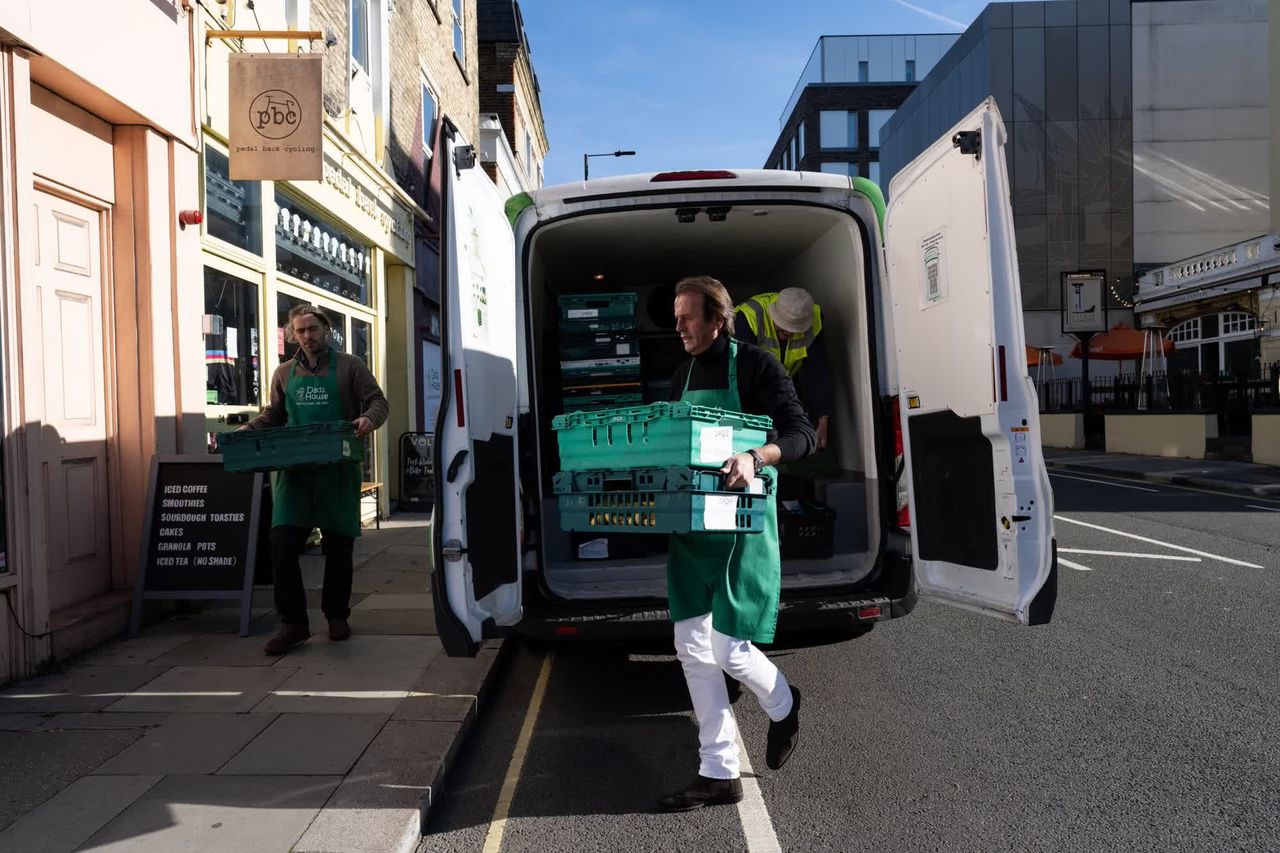 Dad’s House founder Billy McGranaghan, center, carries in a food delivery from the Felix Project.
Dad’s House founder Billy McGranaghan, center, carries in a food delivery from the Felix Project.
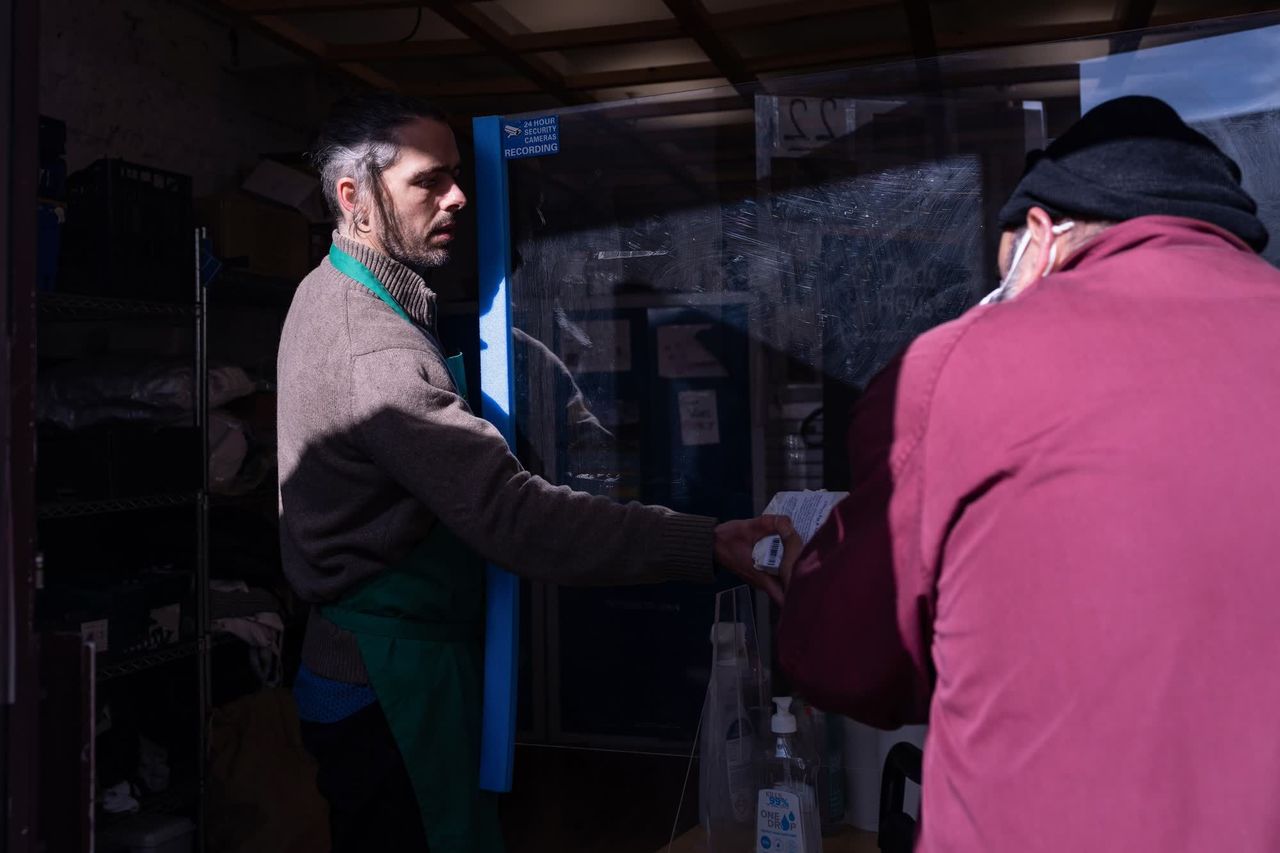 Dad’s House volunteer Luke Tydeman, left, helps a customer.
Dad’s House volunteer Luke Tydeman, left, helps a customer.
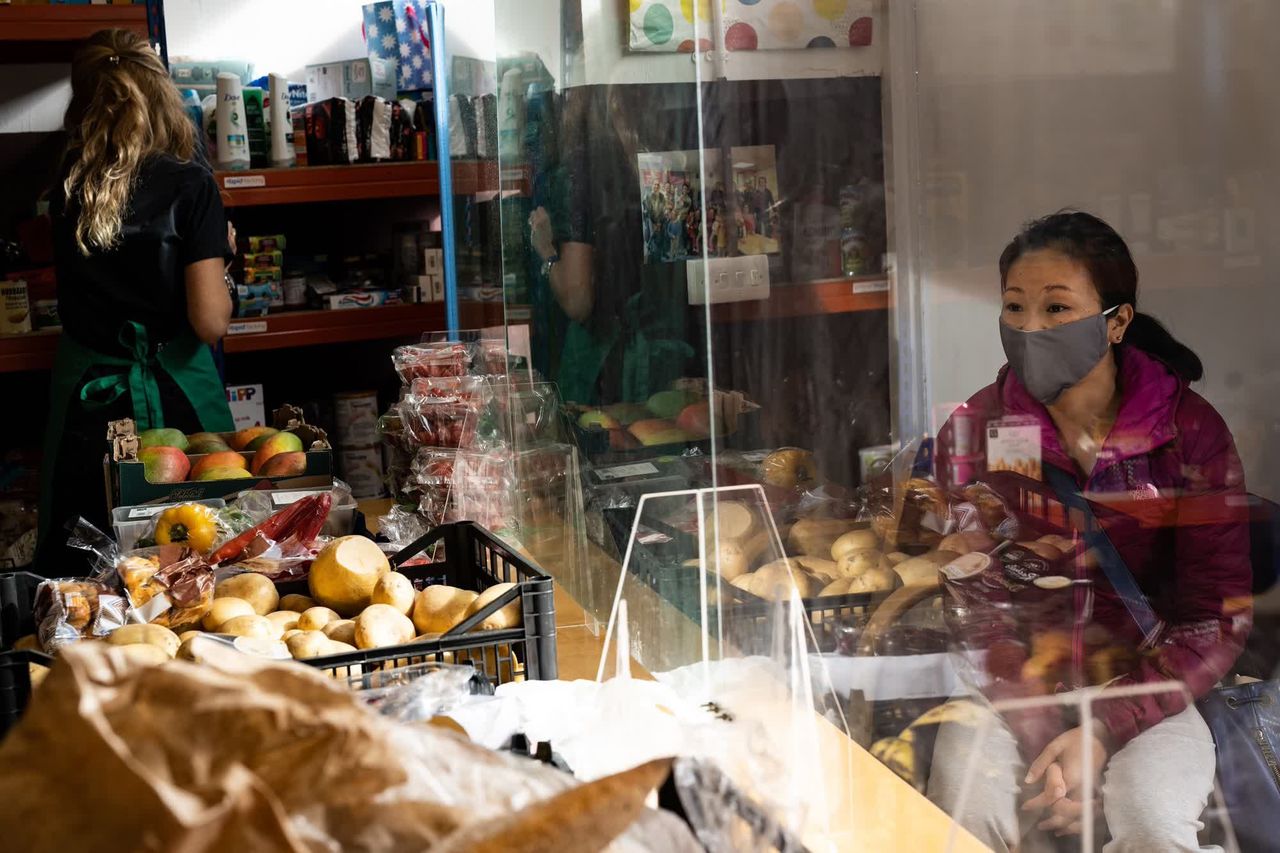 Hundreds of people are served at Dad’s House each week.
Hundreds of people are served at Dad’s House each week.
McGranaghan said that Dad's House has served teachers, graphic designers and journalists during the pandemic. People tend to come to the food bank via referrals from the local government, or after searching online for support.
But now, new clients tend to be younger and single. And despite relatively low unemployment and a record number of job vacancies across the country, McGranaghan anticipates a “huge surge” in attendees over the next few months.
“We’re seeing a rise again … because of the electricity prices, because of the gas, because of the end of furlough,” he said.
Marie, 63, who declined to provide her surname, first came to Dad’s House four months ago and is already worried about her next quarterly heating bill. Her husband has problems with his blood circulation, she said, so maintaining a warm house is essential.
“Food-wise we don’t eat a lot because we don't indulge in luxurious food, it’s just basic,” she said. “It’s the energy prices that's never come down, never come down, so that is the worry.”
Seven miles to the east, at another London food bank, up to 100 customers were expected at an evening meal service attended by CNN Business. Staffers prepared pumpkin soup.
Robert Hunningher, 42, turned part of his catering business, Humdingers, into a food bank in May last year, serving up to 1,000 people a week during the lockdown.
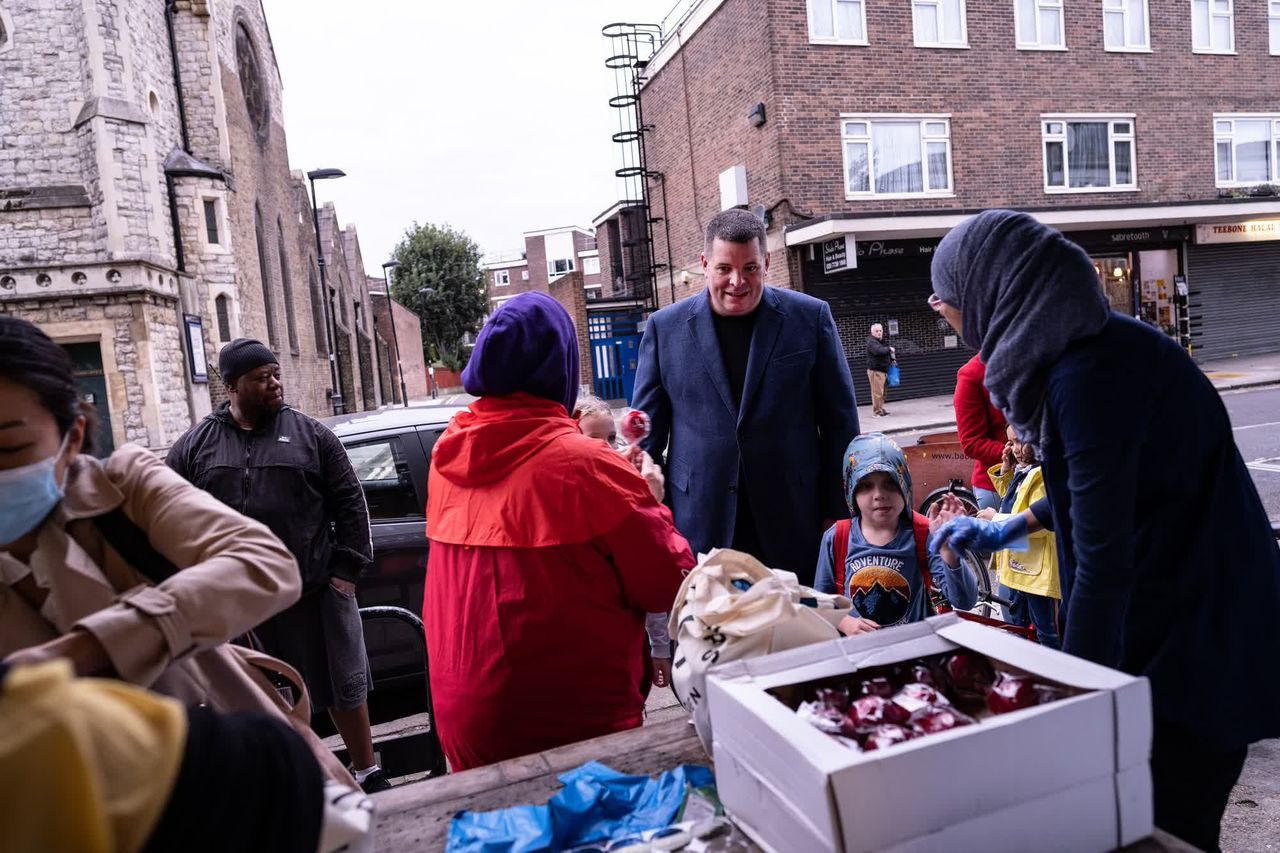 Robert Hunningher, owner of Humdinger's Soup Kitchen, stands with his
6-year-old son, James, and greets customers lined up outside.
Robert Hunningher, owner of Humdinger's Soup Kitchen, stands with his
6-year-old son, James, and greets customers lined up outside.
He said the number of visitors has “skyrocketed” by up to 250 per week since late September. A wide range of people are now turning up, he said, including young professionals, schoolteachers and a semi-pro tennis player.
“Even if you have a job, there’s no hope because you can't afford to live here,” Hunningher said. “Everything is out of arm's reach and then the prices are going up so much.”
Gary Lemon, director of policy and research at The Trussell Trust, which distributes groceries to about two thirds of UK food banks — although not Dad's House or Humdingers — told CNN Business that many of its members are “very busy with more people needing to come to them for emergency food.”
“They expect this to continue in the weeks leading up to Christmas," Lemon added.
Bills through the roof
Rising fuel and food costs have pushed up household bills for millions of Britons. Since January, wholesale gas prices have soared 423%, according to data from industry group Oil & Gas UK. A mix of factors explain the rise, including higher demand from Asia and lower-than-expected Russian gas exports.
In response, the UK energy regulator increased its consumer price cap — the maximum suppliers can charge customers per unit of energy — by up to 13% starting October 1, affecting 15 million people.
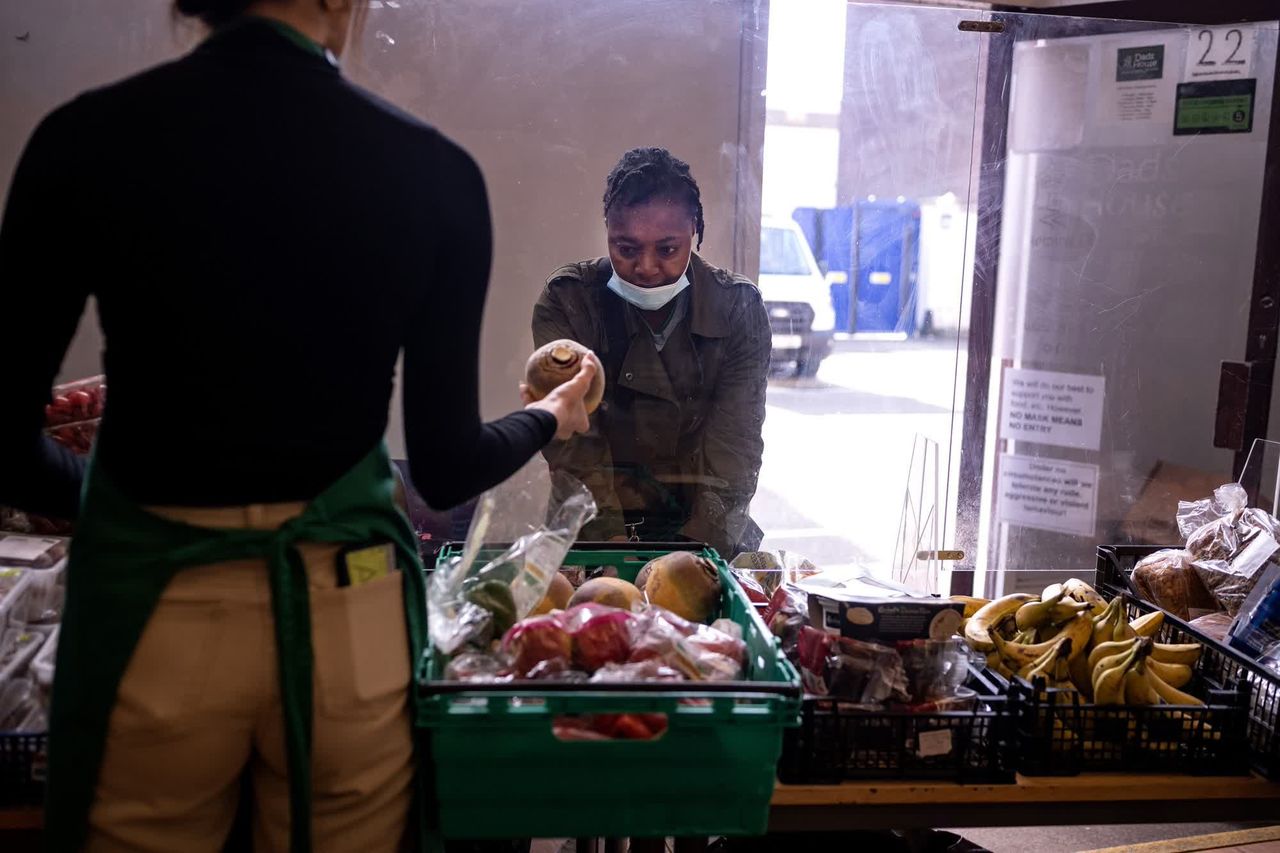 A volunteer helps Guke Dainkeh select produce at Dad’s House.
A volunteer helps Guke Dainkeh select produce at Dad’s House.
Jameson Keane, 49, an artist who cares for his mother, started coming to Dad’s House during the pandemic.
“I’m on a limited budget, about £100 ($138) a week,” he told CNN Business. “My money gets eaten up very quickly.”
Keane said his energy costs are higher than ever before, despite using similar amounts of fuel. He estimates that the money in his energy meter is being spent about “a third faster in the last two weeks — especially the gas.”
Higher energy prices are a problem across Europe, but Britain's relatively low levels of stored gas make it particularly exposed to volatile energy markets.
Many Brits are bracing for higher bills in April when the energy regulator next adjusts its consumer price cap.
‘Heating or eating’
More than a decade of government austerity in the United Kingdom has eaten away at budgets for health care, housing and welfare. A blistering 2019 report by the United Nations’ Human Rights Council blamed spending cuts for the “systematic immiseration of millions.”
Before the pandemic, about 14.5 million Britons, or 22%, were living in poverty, according to the government's own measure. The Joseph Rowntree Foundation, a think tank, expects even more people to fall into poverty as pandemic benefits taper off.
 Kadriye Ali stands outside Humdinger's Soup Kitchen. She has noticed
food becoming more expensive and started going to the food bank 10
months ago.
Kadriye Ali stands outside Humdinger's Soup Kitchen. She has noticed
food becoming more expensive and started going to the food bank 10
months ago.
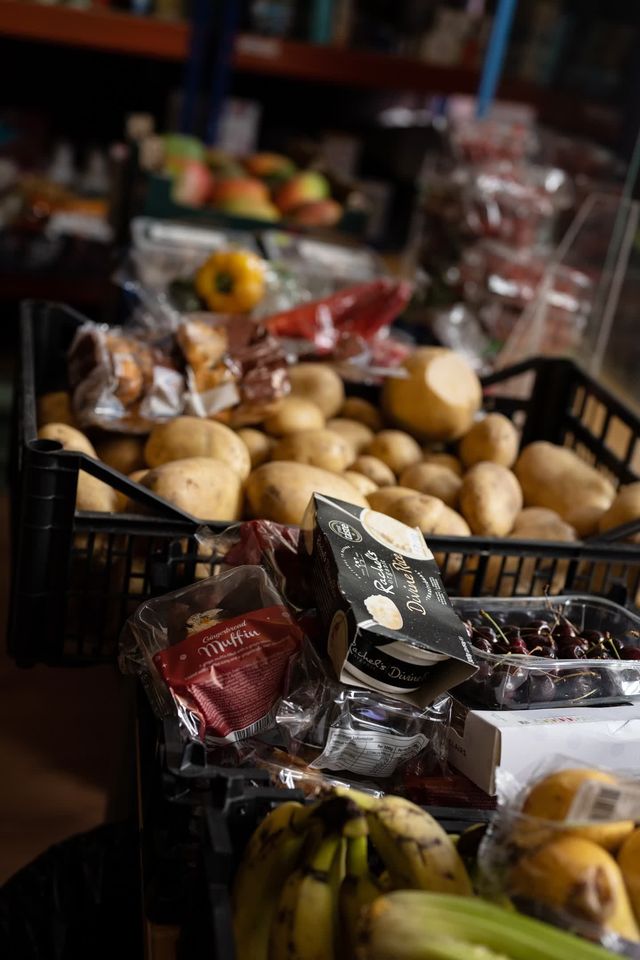 Fruits and vegetables are on display at Dad’s House. Food banks in London have reported a surge of visits in recent weeks.
Fruits and vegetables are on display at Dad’s House. Food banks in London have reported a surge of visits in recent weeks.
In early October, the government cut Universal Credit — a benefit claimed by those out-of-work or earning low incomes — back to its pre-pandemic level. More than 5.8 million people lost £20 ($28) a week, adding up to £1,040 ($1,431) a year.
McGranaghan said the cuts have forced some of his clients to make difficult choices.
“(They will) have a salad on a cold October night instead of actually having something that they could have put in the oven,” he said. “That's the reality of losing £20 a week — it’s heating or eating.”
Amina, a food bank client who declined to give her full name, said the temporary benefit hike had been a lifeline for her family of five.
“For me it’s very helpful, £20, maybe for another, someone else it's nothing, but for me it’s money, especially for family, if you’ve got kids,” she said.
“When you’re used to having something and they take it away, you can feel the difference,” she added. “We don’t know how to manage, honestly.”
The UK government has also wrapped up its £69 billion ($95 billion) pandemic furlough program. In August, it reduced payments to employers from 70% of a worker's monthly salary to 60%, before stopping them altogether at the end of September.
Sabine Goodwin, coordinator of the Independent Food Aid Network, an organization representing more than 500 food banks, including Dad's House, told CNN Business that “there’s a real danger that demand will outstrip food banks' capacity to support people” this winter.
She added that the government's reliance on charities to feed its people was “neither morally acceptable nor sustainable.”
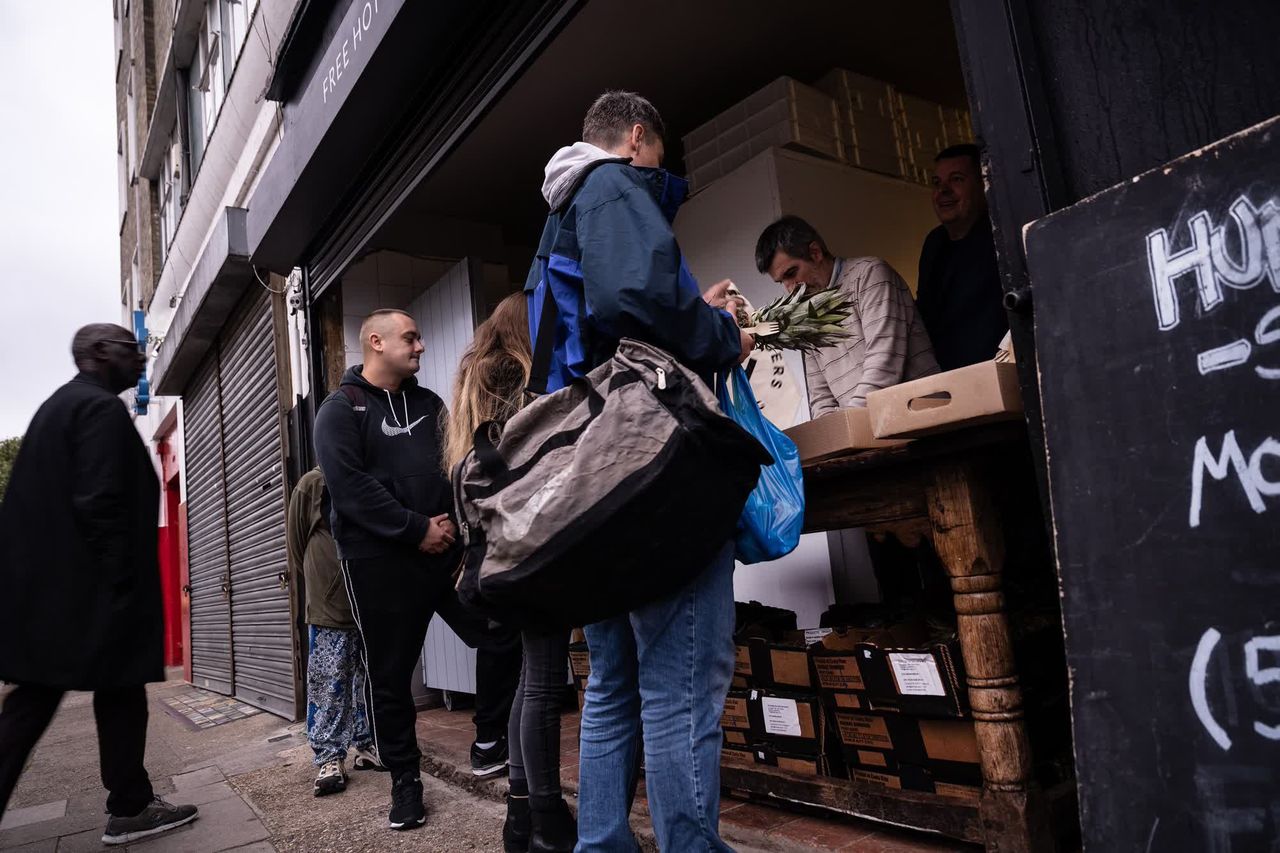 People line up for hot meals outside of Humdinger's Soup Kitchen.
People line up for hot meals outside of Humdinger's Soup Kitchen.
A spokesperson for the UK Department for Work and Pensions, which administers benefit payments, told CNN Business that “Universal Credit continues to provide a vital safety net for millions.”
The spokesperson said that the government was committed to eradicating poverty and had created a new £500 million ($688 million) fund to help “the most vulnerable with essential costs through this winter.”
A ‘Catch-22’ for strained food banks
Food banks are not a new phenomenon in modern Britain — between 2010 and 2019, the number of emergency food parcels distributed by The Trussell Trust rose 2,543%, driven in part by cuts to the country’s social security system.
But supply chain bottlenecks, inflating food prices and shortages in supermarkets have limited their ability to feed struggling households as the economy emerges from its pandemic slump.
McGranaghan told CNN Business that this puts Dad's House in a “Catch-22.”
“We’re relying on the public to donate food, but they haven’t got enough food on the shelves for their families,” he said. “That’s when the donations decrease and that's a huge, huge worry for all independent food banks.”
In east London, Hunningher said that supermarkets no longer let him buy in bulk as they are short of stock.
“I’m having to go to more expensive places,” he said. “The 20 (pence) pasta at Tesco’s (supermarket) is fantastic and I need seven boxes a week — I’m not allowed it.”
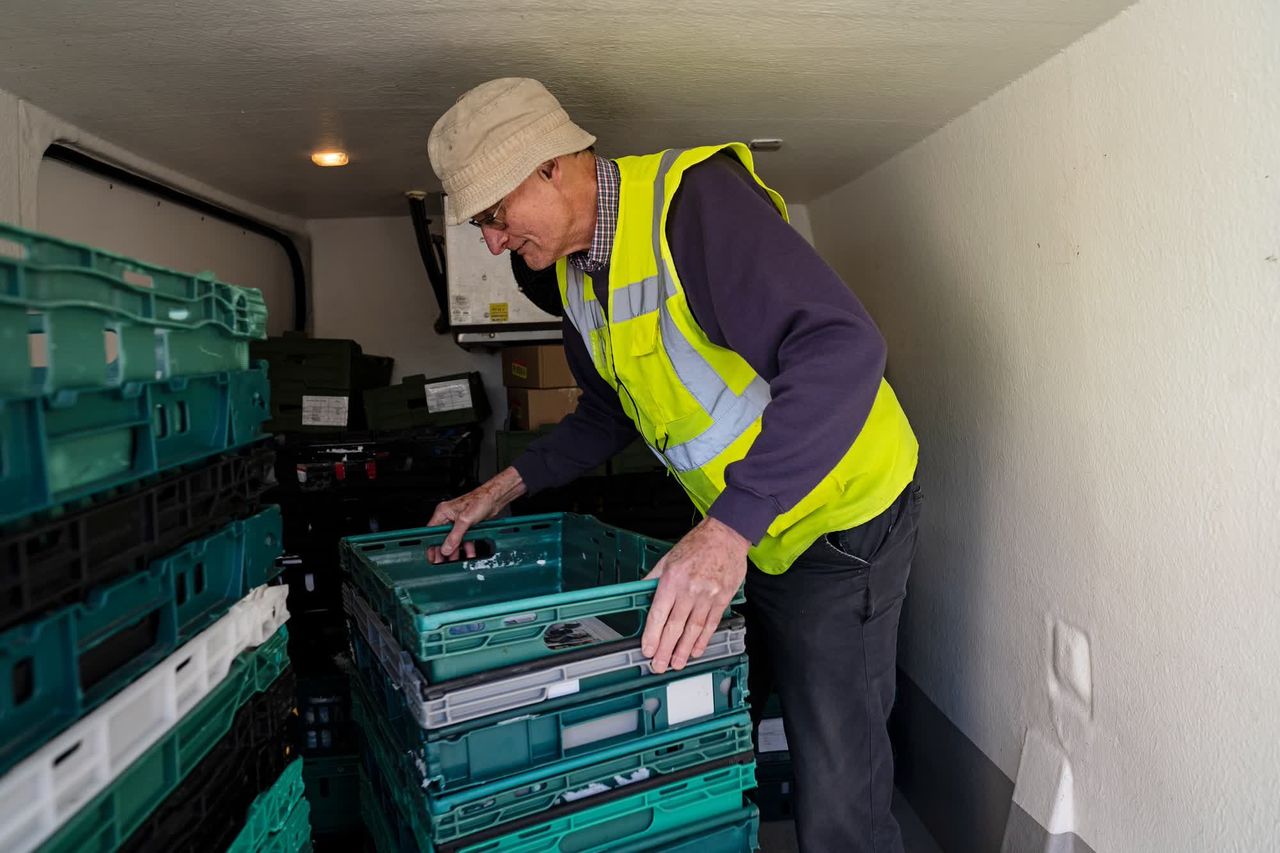 Gerald Stevens delivers food to Dad’s House from the Felix Project.
Gerald Stevens delivers food to Dad’s House from the Felix Project.
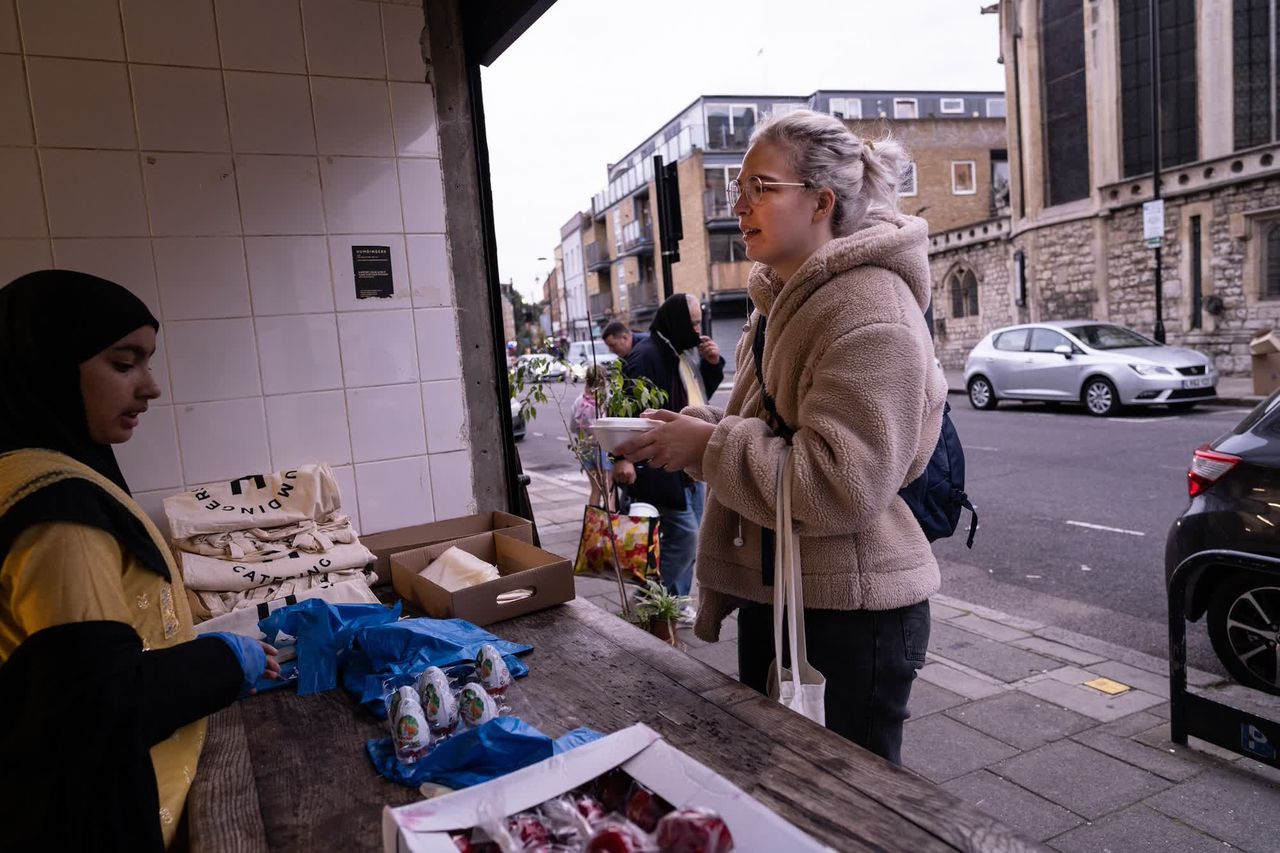 Mai Pedersen receives a hot meal from Humdinger's Soup Kitchen. Like
many others, she was working up until the pandemic, and then fell upon
hard times and started accessing free meals.
Mai Pedersen receives a hot meal from Humdinger's Soup Kitchen. Like
many others, she was working up until the pandemic, and then fell upon
hard times and started accessing free meals.
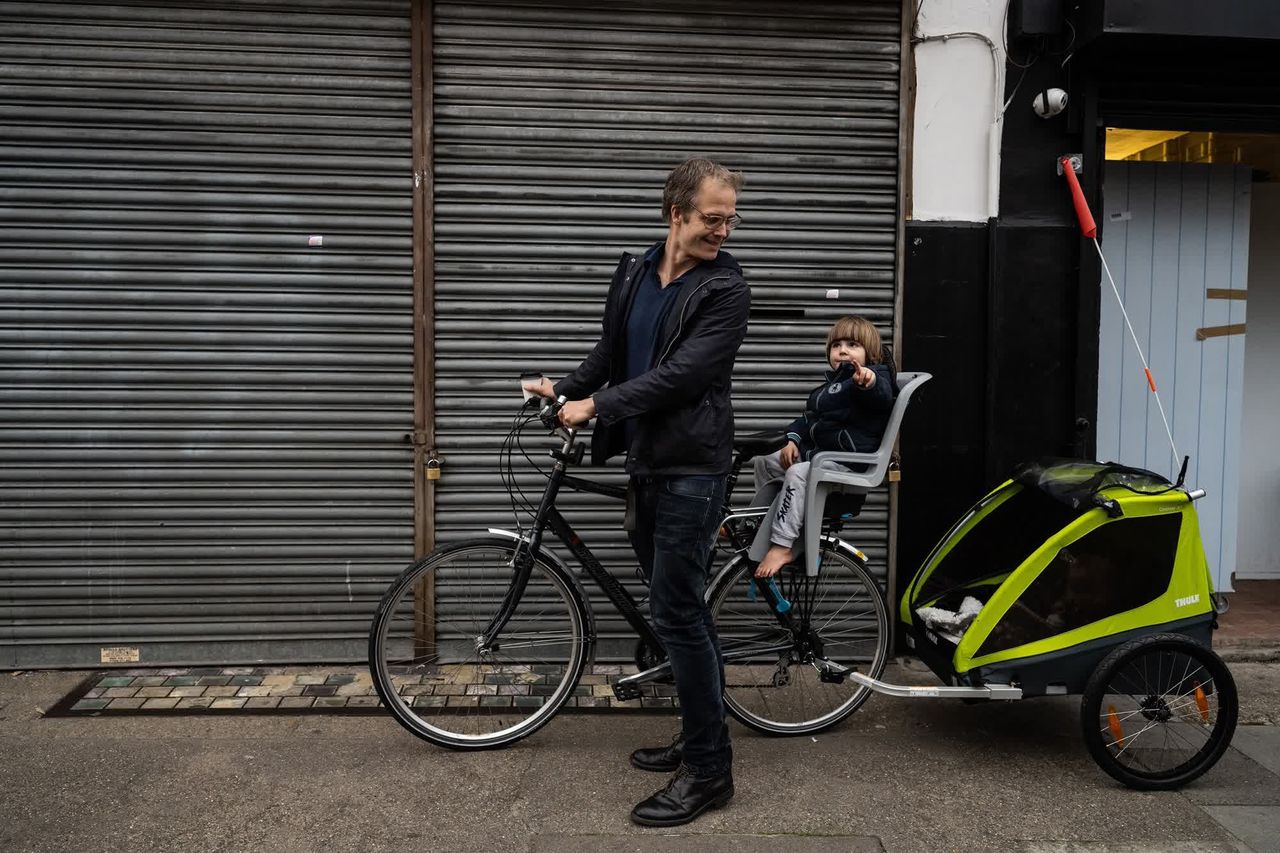 A father arrives at Humdinger's Soup Kitchen with his children. A wide
range of people are now turning up, says Robert Hunningher.
A father arrives at Humdinger's Soup Kitchen with his children. A wide
range of people are now turning up, says Robert Hunningher.
Supermarkets are having trouble keeping their shelves stocked because the United Kingdom is short 100,000 truck drivers, due in part to an exodus of EU workers following Brexit. The pandemic also limited the number of certification tests for new commercial truck drivers.
Shortages were made even worse in September when service stations across the country ran out of fuel following a spate of panic buying.
FareShare, a charity which redistributes surplus supermarket food to charities and community groups, including food banks, told CNN Business that all of its 30 regional centers had been affected by shortages.
Lindsay Boswell, FareShare's CEO, said that it normally receives up to 160 metric tons of groceries a day, but the fuel shortage cut deliveries to under 100 metric tons.
“Up to 30% of the food we would normally expect to receive into our warehouses on an average day is at risk of not reaching us,” Boswell said. “And (is) therefore at risk of not reaching the vulnerable people we support.”
‘We’re going back in time’
Some economists have warned that rising inflation in the United Kingdom, combined with weak economic growth, could lead to a period of “stagflation” reminiscent of the 1970s, when wages failed to keep pace with the rocketing cost of living.
As higher grocery prices erode Britons’ purchasing power, food banks are preparing for more visitors, and to spend more themselves.
Rajesh Makwana, the director of Sufra, a food bank in north-west London, told CNN Business that he is “bracing for increased demand as the cost of living continues to rise.”
“Our food costs are already unsustainably high, so even a small increase would be painful,” he added.
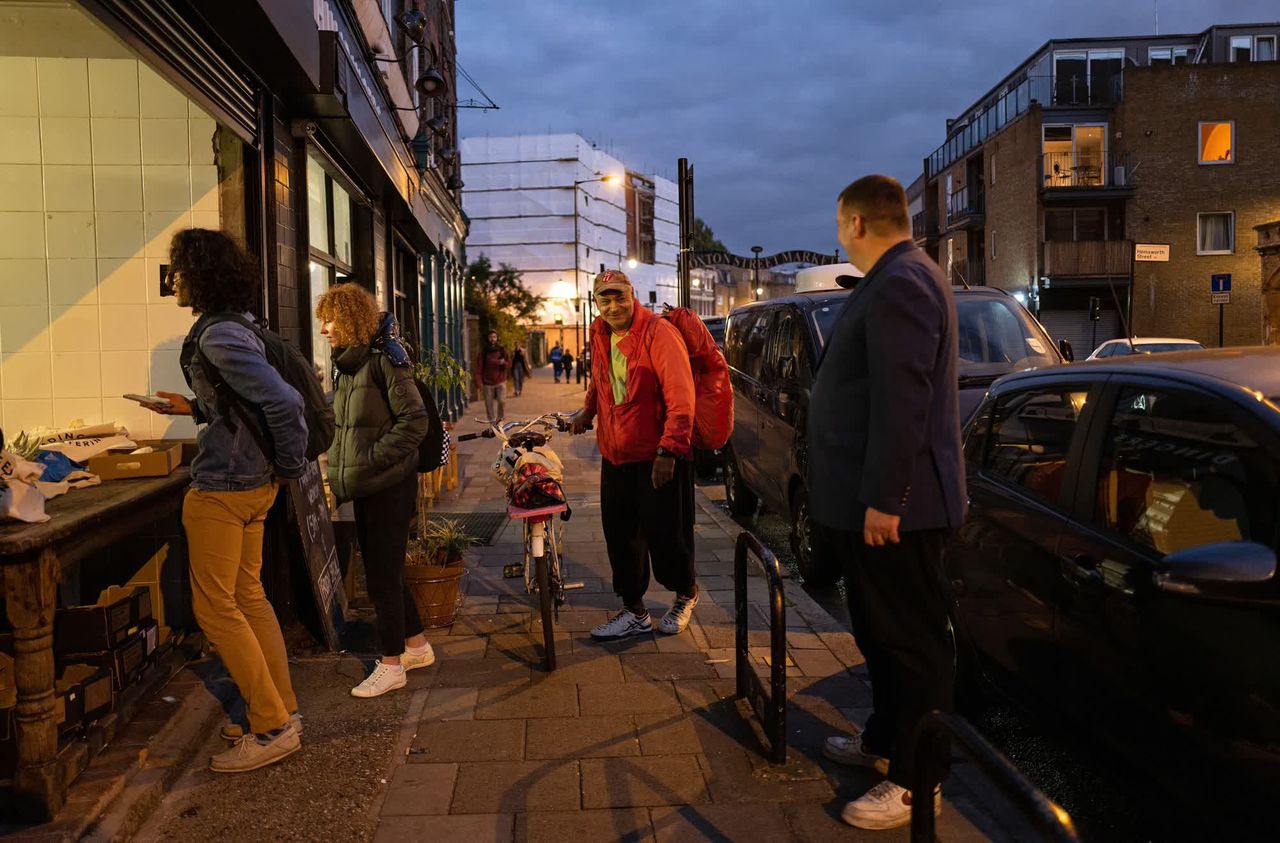 Michael Mercury, center, talks with Humdinger's Soup Kitchen owner Robert Hunningher while lining up for a meal.
Michael Mercury, center, talks with Humdinger's Soup Kitchen owner Robert Hunningher while lining up for a meal.
Inflation was up 3.1% in September, according to official data. That's above the central bank’s target rate of 2% but far short of the 5% pace that could be reached early next year, according to Bank of England chief economist Huw Pill.
The government plans to increase the minimum wage from £8.91 ($12.27) to £9.50 ($13.09) an hour in April, but the mounting cost of living will temper the boost to Britons' spending power.
Geraldine Hurley, 62, a retiree from east London, passed by Humdingers as it opened its evening meal service, and stopped to talk to CNN Business.
“My coffee, it’s always been £5 ($6.88) a jar, it’s now in Tesco’s for £5.75 ($7.91),” she said. “What sort of increase is that?”
Although Hurley applauds food banks like Humdingers for stepping up to support her community, she is frustrated by their necessity.
“We really shouldn't be doing it nowadays,” she said. “We’re going back in time.”











